Social Media Needfinding
The Veil
"A social app for someone who's not social"
Started imagining a social app where me myself, most time an introvert, would like to use, the word "veil" bumped into my mind. Frankly, I was not thinking about hiding myself, but someone wearing a veil. Like strangers, who you don't know, and I enjoyed the moment of obsevating them and imagining their stories. Sometimes my interest was aroused by their appearance, sometimes by their behaviors, or simply by the feelings they gave me. However, I never actually walked up to them and initiated a conversation, because that might be unwanted and I am not a social person. Since everything is distanced and unclear about the stranger, the veil is more a metaphor for the mysteriousness. But indeed I would like to know more about them, and I believe there are many people like me. So I started to think about if there's a way to build a social app for people like me, who are not social, but still want to build new connections.
Planning the Interview
my draft of the interview plan
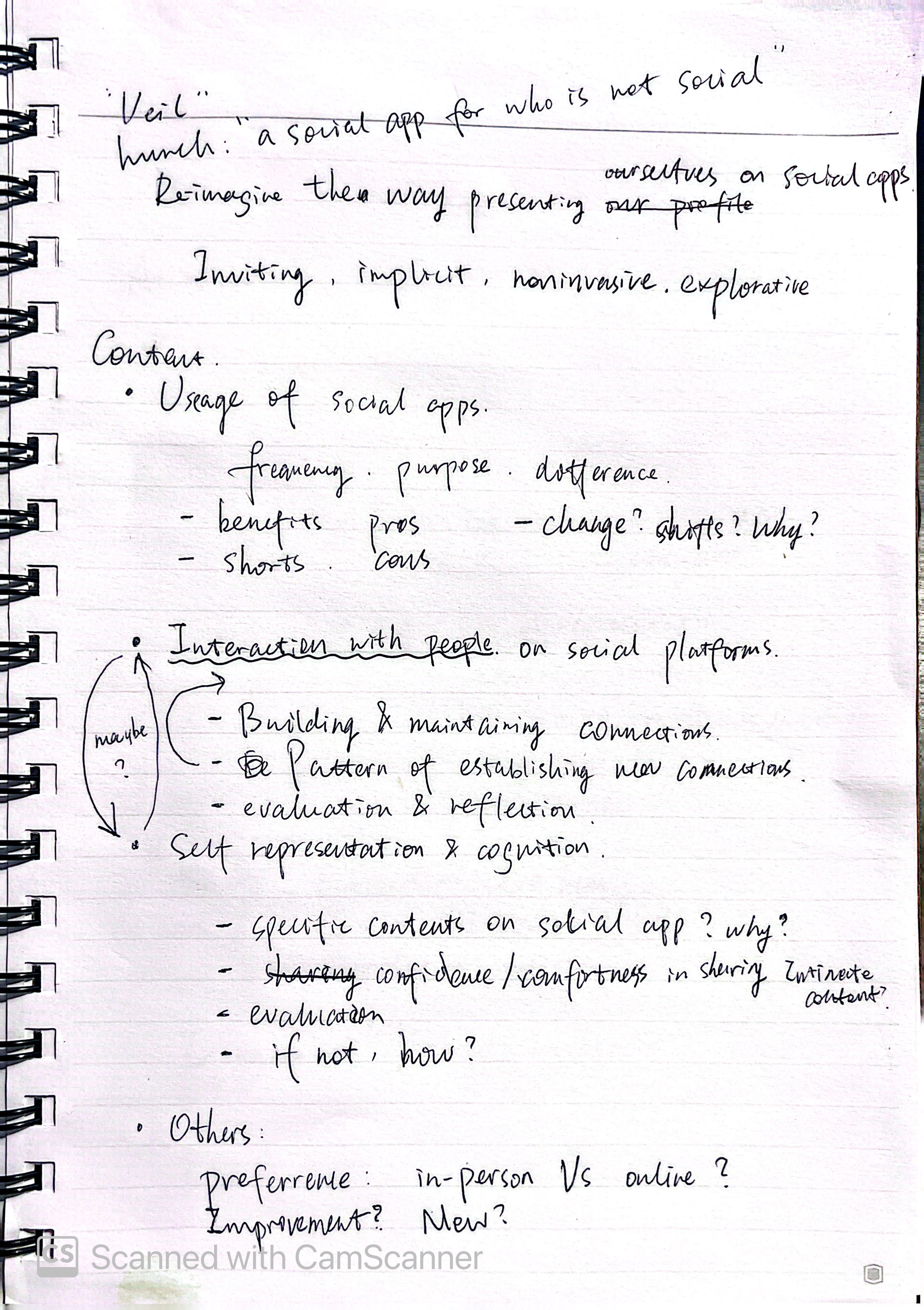
As this interview was intented to be a needfinding, I tried to keep the questions open-ended and let the interviewee talk as much as possible. But still I would like have a structure to follow, so I planned the contents to be majorly three parts:
- the interviewee's social media usage,
- the interviewee's social life with people on their social app(s),
- the interviewee's thoughts on how themselves are represented on social media.
I would stick these three sections and improvise the questions based on the interviewee's responses. The questions I prepared are as follows:
1.1 How often do you use social media? What social apps do you use? How do you use them?
1.2 (If the interviewee mentioned they've swtiched from one social app to another or abandoned one) Why did you switch/ abandon the previous one? What's the difference between the two apps?
1.3 What do you like about the social apps you use? What do you dislike about them?
2.1 How do you interact with people on social media? Do you have any friends on social media that you don't know in real life? How do you interact with them?
2.2 (If the interviewee mentioned they've met and knew people on social media) How did you meet them? Do you see a pattern of how you build and maintain connections on social apps?
2.3 (evaluation & reflection) How do you feel about your social life on social media? Do you think it's different from your social life in real life? How do you feel about the difference?
3.1 (content curation) What kind of content do you post on your social apps? Do you post different content on different apps? Why?
3.2 (self-representation) How do you think you are represented on social media? Do you think it's different from how you are in real life? How do you feel about the difference?
3.3 (evaluation & reflection) Do you feel like confident or comfortable in sharing certain contents (e.g. photos, videos, intimate thoughts) on social media? Why? Do you think you are being yourself on social media? Why?
The Interview
Interviewee 1 : Oliver
Oliver is a friend I've just met. He's from Colorado and is now doing his graduate thesis project at Autodesk. He is doing his master in architecture and digital fabrication. He's introverted and not very social (as he claimed himself), but he's very friendly and easy to talk to.
Breif Summary
Oliver is mostly on Instgram and he uses the app to post his works and follow his friends. As he conludes, Instagram is mainly for professional purpose as it's more visually smooth and designer-friendly (many designers post their works such as photographs, videos). He acutally got his last job from the firm's Ins post and one of his best friends was met through Ins (his friend was interested in his works and cold texted him). "The sign of a best friend is sharing meme videos", laughed Oliver when asked about the way he interacts with people on social media. He also mentioned that he tends not to post about his personal life, and that's why he likes the Ins story feature for just sharing a moment.
Takeaways
- A one-purpoese app is preferred instead of a "toolbox".
- An interesting insight: Build new connections online and mantaining them in real life OR Build them offline and mantaining online
- A Desperate need 😂 : the "send/receive money" feature, preferrably supporting international transfer
Below is the notes I took during the interview.
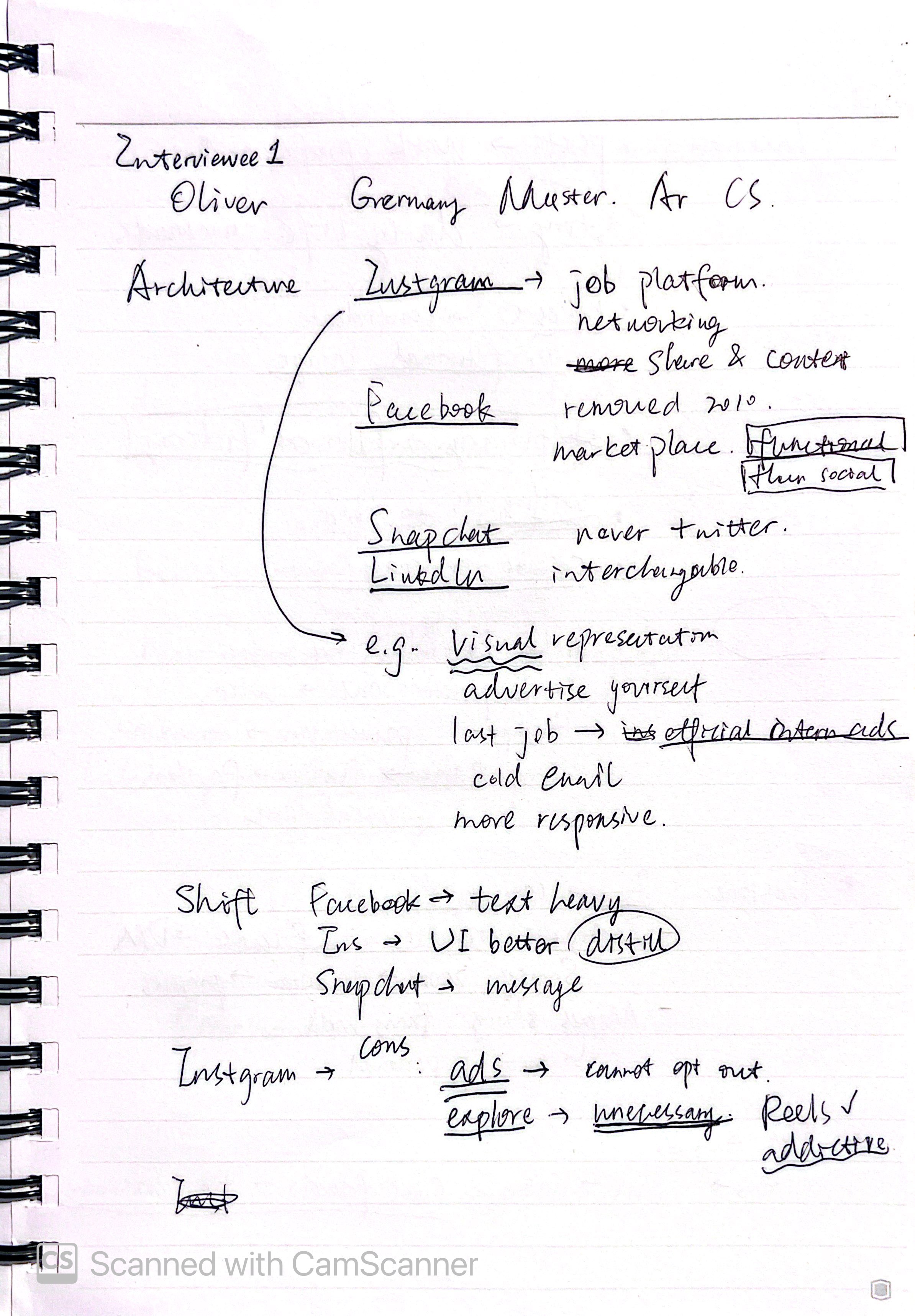
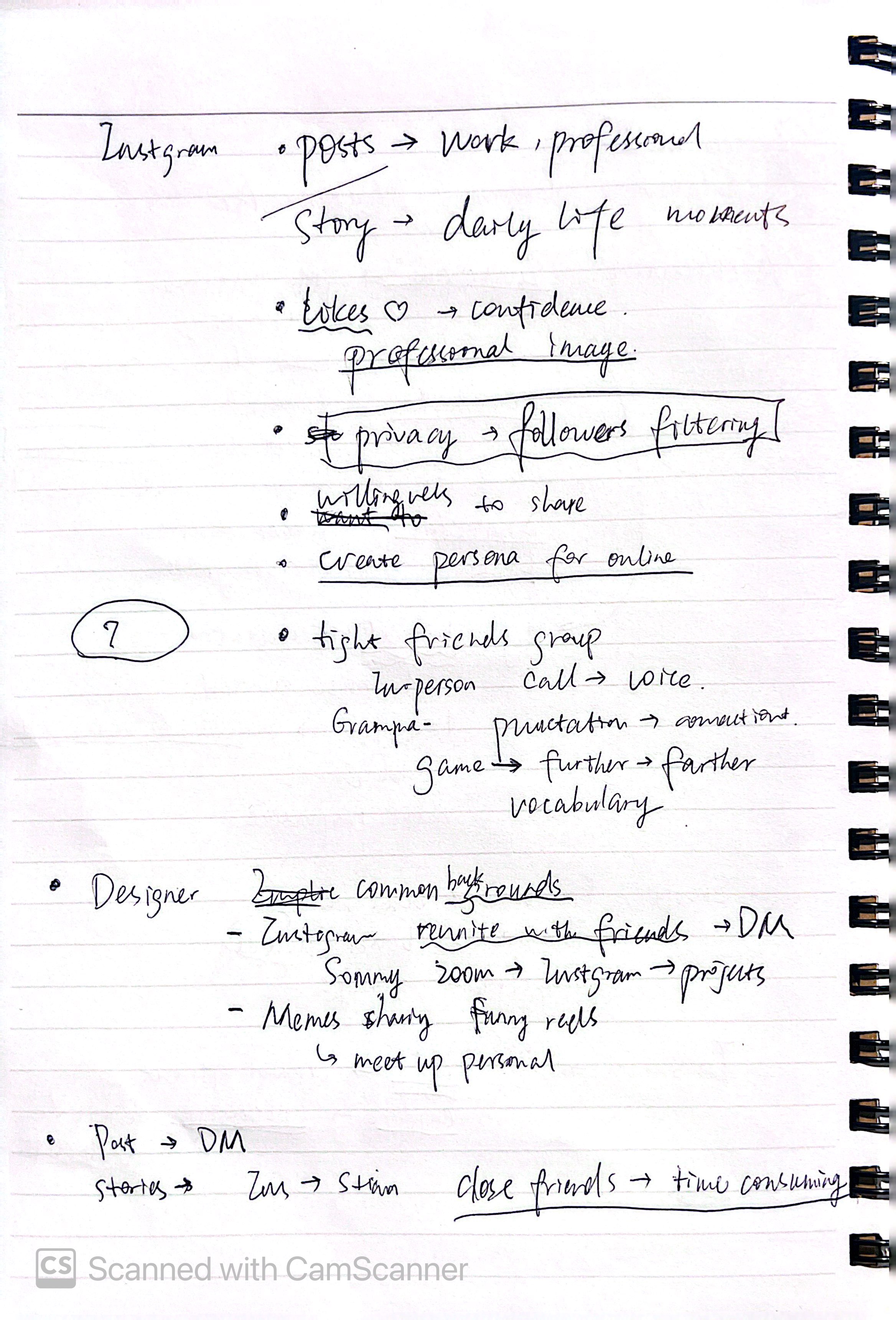
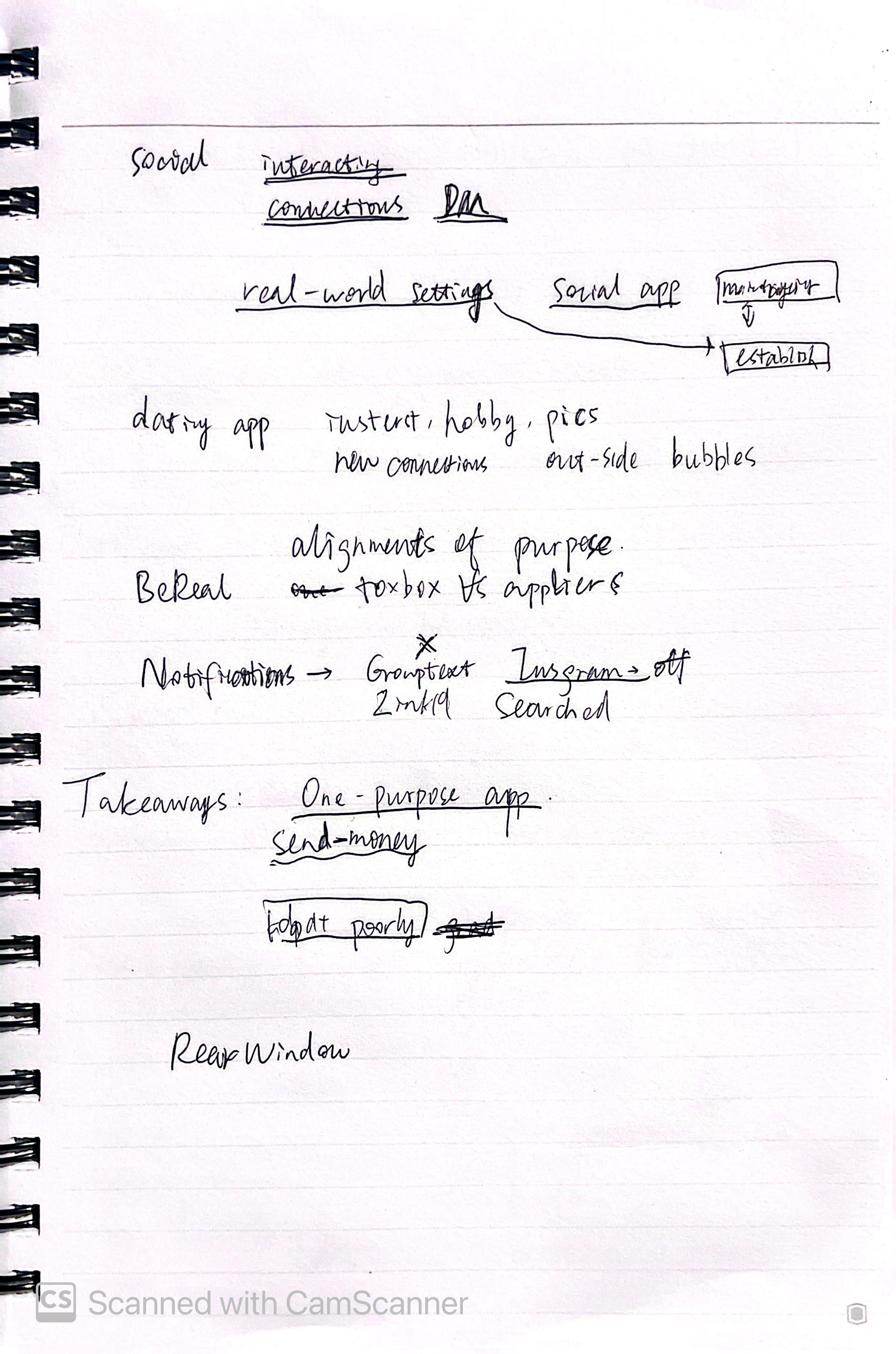
Interviewee 2 : Xinyi
Xinyi is a friend I've known for a while. She's from China and is now doing her master in MDes Mediums at Harvard. She's a typical introvert. We went bouldering together a lot and she's a very good climber. She had a bachalor degree in film and now she's exploring the intersection of design and technology.
Breif Summary
Xinyi has a comprehensive usage of all kinds of social apps. She is majorly using Wechat (for Chinese friends and family), and Instgram (after she came to the US). She also used to use Facebook, Messenger, Snapchat, Weibo and QQ. She quit mainly because of changed preference and the app's content. She also uses RED but mainly for content consuming. Xinyi likes how Wechat is a one-stop app for everything, but she dislikes the app's short video feeds and ads in private moments. She likes how Instagram is a visual app and she can follow her friends' lives in stories, but she dislikes the app's algorithm and the reels.
"I always find it easier to build connections with starngers if we are in the same setting or trying to achieve the same goal", said Xinyi when asked about how she interacts with people on social media and in real life. She used bouldering as an example, where it's easier to initiate a conversation with a stranger if they are both trying to solve a line.
Takeaways
- Being introvert does not mean anti-social, but social in another way
- Similar settings invoke communication between strangers
- An interesting idea: Can we make friends with people when we are waiting in the same line?
Below is the notes I took during the interview.
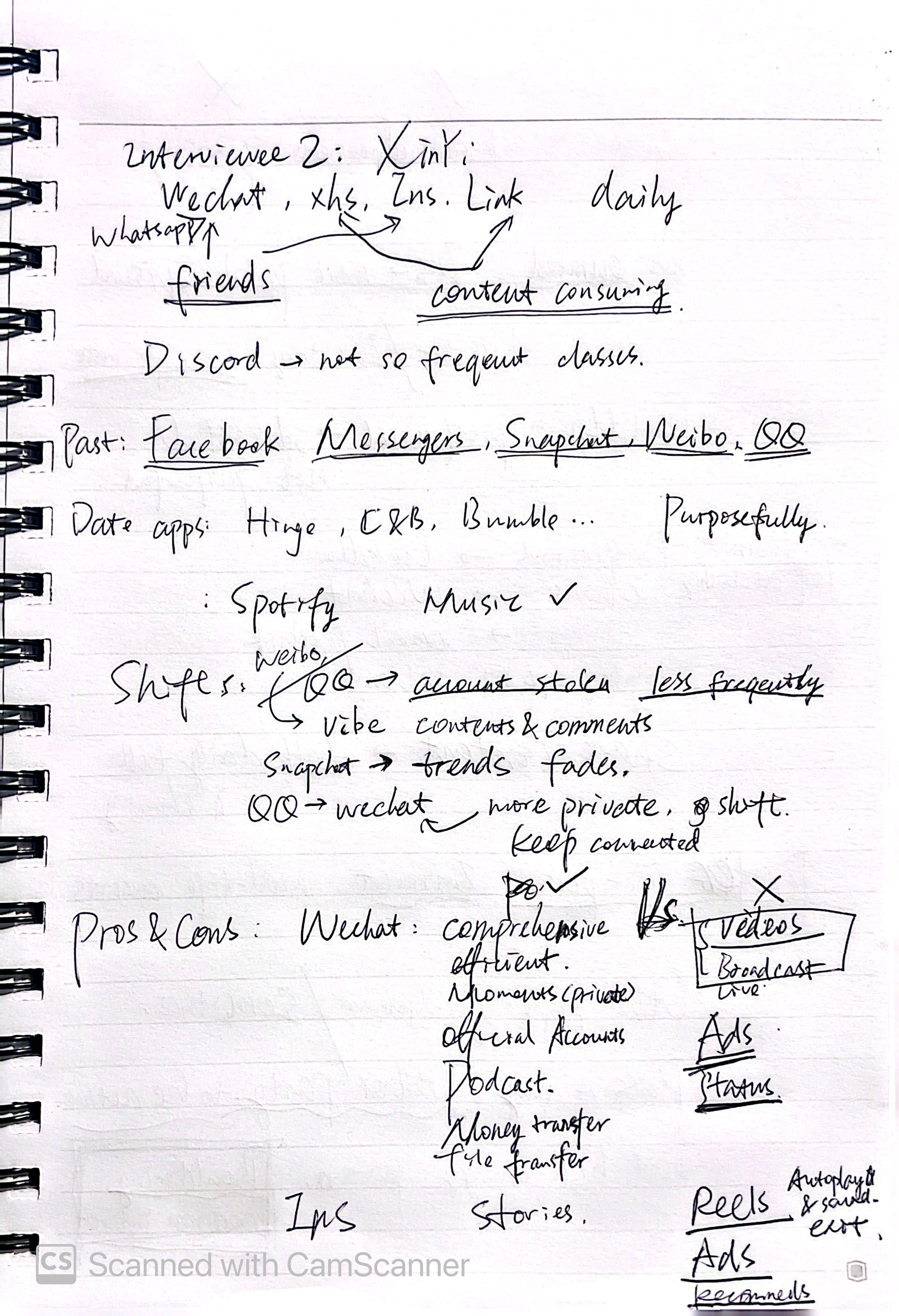
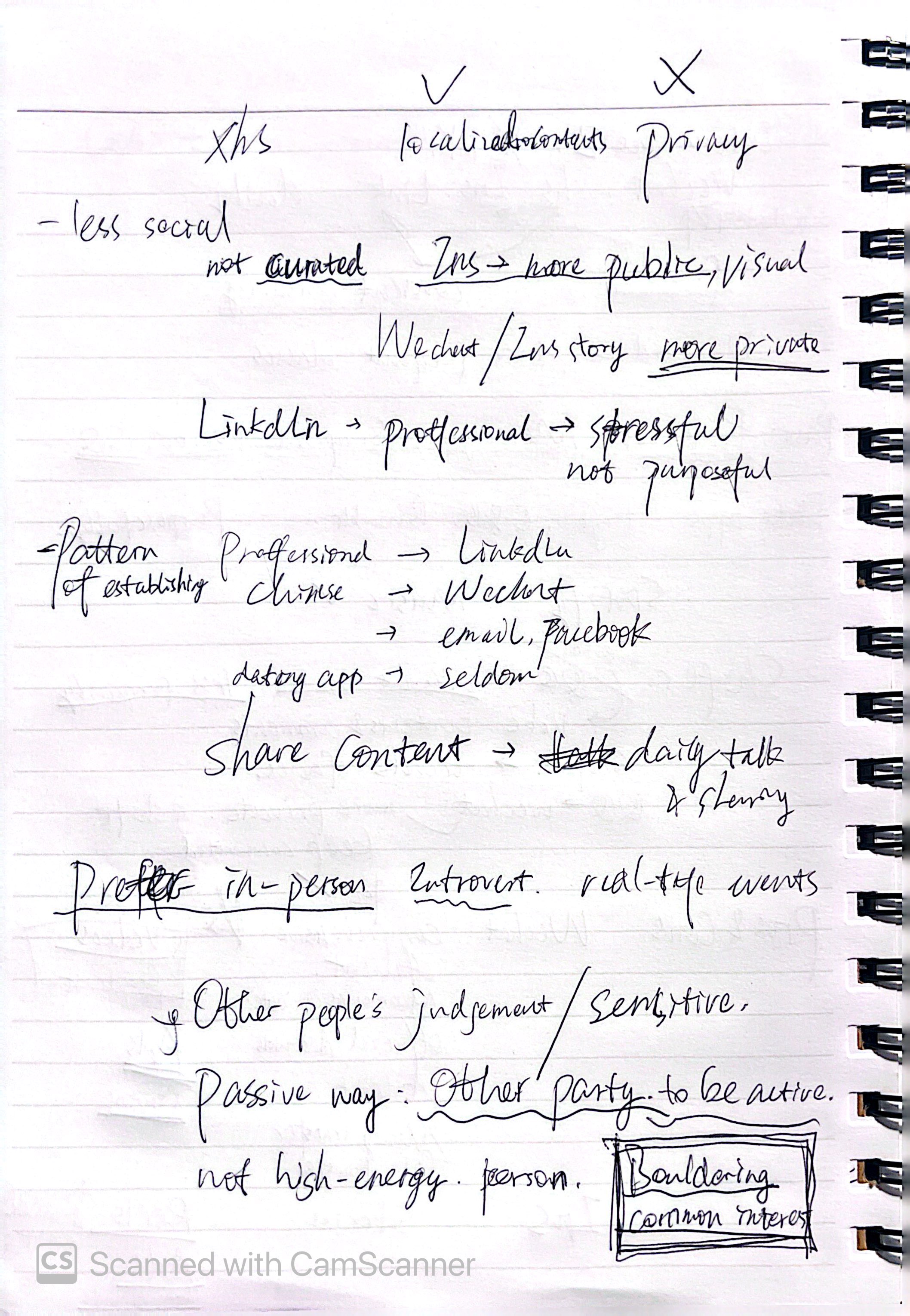
Design Opportunities
- For introverted people, it's usually not that they don't like to socialize, but they prefer to socialize in another way. The dominnet social apps are designed in an "extroverted" way, where people are encouraged to share their personal lives and intimate thoughts. Can we design a social app for introverted people, where they can socialize in a way they feel more comfortable?
- In the interview, I found that introverted people tend to build connections with strangers in real life. In the interviewee's words, "I always find it easier to build connections with starngers if we are in the same setting or trying to achieve the same goal". Can we design a social app that helps introverted people meet and build connections with strangers in real life?
- Many introverted people are not comfortable with sharing their personal lives and intimate thoughts on social media. This is partly because the mainstream social apps are designed to share the best sides of people's life, which implictly invites comparison and judgement. In turn this pushes people to intentionally curate their contents. Can we break this cycle by introducing a new way of content curation and less judgemental social interactions?